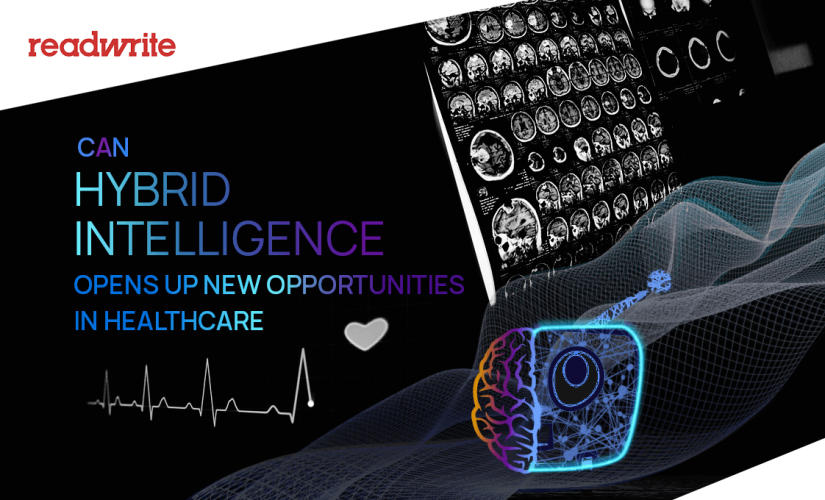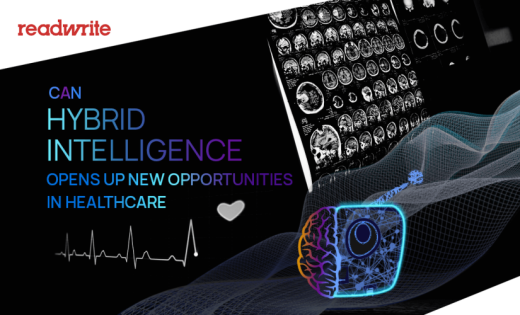Can Hybrid Intelligence Opens Up New Opportunities In Healthcare
Can Hybrid Intelligence Opens Up New Opportunities In Healthcare

Over the last decade, we have made groundbreaking achievements like artificial organs, robotic surgery, telehealth, wearable health trackers, precision medicine, and so on. The transformative power seems so promising that the healthcare industry is making investments in AI technologies. A mutual augmentation of men/ women with machines can fast-track progress in healthcare.
Technology has come a long way, transforming from an enabler to a confederate. With digital technologies, the healthcare sector has achieved massive innovative leaps. A major chunk of healthcare providers have integrated cutting-edge technologies at the frontier, to fight illness, develop modern vaccines, pharmaceutical advances, save lives, improve quality of life.
“We believe consumer health technologies apps, wearables, and self-diagnosis tools have the potential to strengthen the patient-physician connection and improve health outcomes.” – Dr. Glen Stream, Chairman, Family Medicine for America’s Health
Regardless of the rising concerns around AI, technology has become an indispensable element in our life. The healthcare sector is witnessing a dynamic shift towards hybrid models, wherein technology and humans work in sync to deliver a better quality of life.
Hybrid Intelligence a Revolutionary Breakthrough
With hybrid intelligence, we no longer rely on compartmentalized task allocation nor try to keep humans in the loop. It’s a deliberate effort to allocate tasks between humans and conversational agents (combining human and artificial intelligence) to co-evolve and deliver better outcomes.
Hybrid Intelligence – Enabling Mutual Augmentation
Developing modern medicines and pharmaceutical products gravely depends upon research, and data is a critical catalyst that drives these mainstream innovations. Big Data revolution, digitalization, and AI technologies have trimmed the time to market for the most innovative breakthroughs. In healthcare, time is a critical factor.
A typical example would be how DeepMind’s AlphaGo used human expertise and advanced algorithms to defeat a Go world champion. Combining a supervised learning approach with humans and utilizing deep learning techniques AlphaGO was able to create one of the most formidable Go player.
Modern technologies have the potential to transform healthcare delivery, but the increasing digital adoption, calls forth multiple challenges. Dynamic cultural shifts and workplace transformation is one critical dimension that needs to be addressed. Integrating smart technologies and empowering healthcare staff with a hybrid model eases the transformation, where both humans and technology work hand-in-hand to deliver the best outcome.
Hybrid Intelligence in Hospitals
Service quality and patient satisfaction are important yardsticks in healthcare. Patient satisfaction has a direct correlation to healthcare quality. With modern technologies hospitals can set, monitor and reinforce explicit care guidelines.
Ensuring seamless communication is essential to drive quality healthcare service. When information is kept in silos, mutual collaboration takes a toll across departmental boundaries. Healthcare specialists, clinicians, and other critical healthcare staff should work as a team, which enables the collaborative diagnosis of diseases and the development of treatment plans across multiple departments. Hybrid intelligence also augments continuous learning wherein humans and systems have a shared journey, learning from each other.
With hybrid intelligence, conversational agents in healthcare systems can augment collaboration and coordination of multiple critical tasks, and even facilitate frictionless patient care under a complex clinical environment. Integrating rule-based and case-based knowledge reasoning mechanisms can be used by healthcare professionals to quickly retrieve similar cases for reference.
Hybrid Intelligence to Make an Impact on Healthcare
- Simple and consistent patient data across departments
- Junior doctors/ residents can accelerate decision-making by virtually connecting and collaborating with specialty doctors.
- Easy retrieval of patient data with a medical history
- Minimize the workload of healthcare employees
- Actively support healthcare employees perform repetitive tasks
AI to Focus on Care & Risk Prediction
AI as a mainstream for risk prediction. Artificial intelligence has shown exemplary promises in detecting Organs At Risk (OAR). The success rate of cancer detection rate by simulated AI radiologists is higher than the cases identified by a resident radiologist.
The increasing number of cancer patients who seek treatment plans has put significant pressure on the radiotherapy department, this can lead to cognitive errors, and take a toll on patient care. AI detection can be used to maximize cancer detection at the initial stage and minimize case recall.
Artificial intelligence has the potential to gather data from multiple libraries and automate repetitive tasks like OAR contouring, simulations, etc to reduce workload and deliver a seamless experience.
Neuromorphic and Artificial Neural Microcircuits
Neuromorphs and artificial neural microcircuits can be a game changer in the healthcare industry. AI comes with multiple applications, from chips to fight diseases to imitate organ functionalities and act as low-cost alternatives for patients.
AI-Driven MedTech in Patient Care
Burnout and being overworked is something that plagues the healthcare sector. Chronic stress and exhaustion can lead to permanent health hazards. Equipping medical technology with hybrid intelligence will help these overworked segments to efficiently manage and optimize their tasks. AI-enabled MedTech has the potential to diagnose subtle anomalies, compare patient data with electronic libraries to identify patterns, explore advanced diagnostics, etc in the background. Ultimately allowing medical professionals to dedicate more time to patient care.
Accelerate Clinical Decisions
Cardiologists and radiologists can make use of AI-enabled medical imaging to prioritize cases based on the nature of severity. Using AI algorithms, healthcare professionals can analyze huge volumes of electronic health records, identify relationships, plot patterns, and construct evidence-based treatment plans. Technology helps healthcare professionals explore new solutions, make trials more efficient, deliver personalized care, and make faster decisions.
In a Nutshell
Is AI for healthcare justified? Well, we are still figuring out a way to fully embrace and integrate AI into a day to day life. If not humanoids, technologies like “Hybrid AI, Narrow AI” have gained wide acceptance across industries. Cutting-edge research and developments are picking up pace around how AI technology can be harmoniously synchronized with healthcare.
The future may be driven by H-AI, a fusion of humans and AI to synchronize and operate as a whole individual. On the contrary, one of the biggest challenges with hybrid intelligence technology and its applicability is, how do you regulate a technology (Adaptive AI) that adjusts its course regularly for the best performance.
The post Can Hybrid Intelligence Opens Up New Opportunities In Healthcare appeared first on ReadWrite.
(18)


